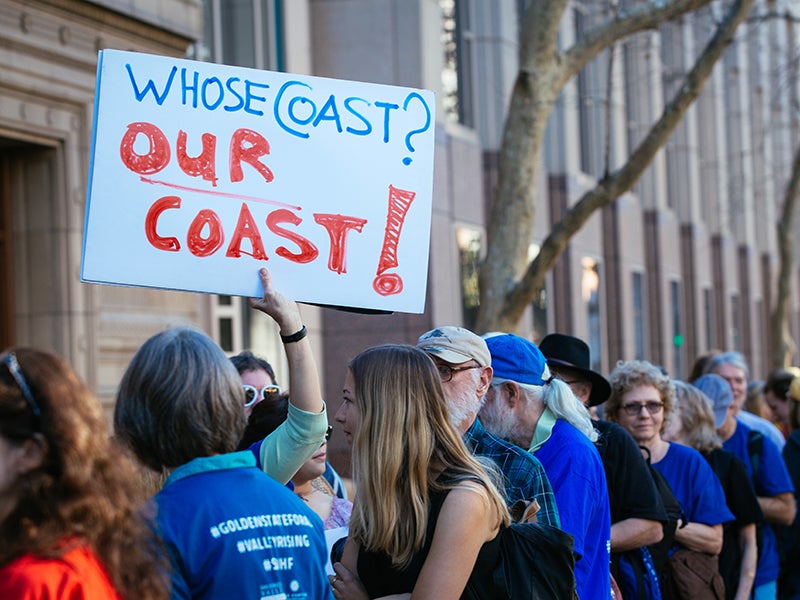Trump Administration Mutes Your Feedback on Offshore Drilling Plan
By law, the Bureau of Ocean Energy Management must collect public input before enacting its five-year offshore leasing plan. But don't expect an actual human being to listen to your testimony.

This page was published 8 years ago. Find the latest on Earthjustice’s work.
The Trump administration is doing away with any pretense of listening to the public on its plans to expand offshore drilling. The government must solicit public input, so the administration has set up “meetings” in coastal states. But there are no microphones. There are no stenographers. There are no government officials listening intently to gauge public sentiment.
Instead, there are only rows of computers. Bulky laptop computers with outdated Windows operating systems, looking as if they had been recovered from time capsules marking an era that predates cellphones.
By law, the Bureau of Ocean Energy Management (BOEM) – the agency responsible for issuing offshore leases to companies drilling for oil and gas in federal waters – must solicit and collect public comment before moving to the next phase of its federal five-year offshore leasing plan, which is expected to be finalized by the end of 2018.
Yet BOEM’s “meetings” – as evidenced by a recent event in Sacramento – seem designed to thwart, not foster, public involvement and discussion of the issues. When coastal residents arrive at the public meetings prepared to provide testimony to the agency about the many reasons why radical expansion of offshore drilling is extremely dangerous and unwise, nobody is there to listen.
While BOEM officials attend these meetings, they are stationed next to posters bearing labels like “Why is Oil Important,” and their interactions are limited to highlighting information on the posters. To have any information or comment recorded, members of the public must instead sit in front of a laptop and watch a video produced by BOEM, again extolling the benefits of oil. Finally, they are invited to type their thoughts into a machine.
Neither the BOEM officials at the meetings nor the community will hear any testimony about climate change and concerns about oil spills wrecking the health, economy and marine life of coastal communities.
Nevertheless, a wide-ranging coalition of environmental and tribal organizations from across the Lower 48 and Alaska have been holding rallies outside these meetings to loudly reject this proposal to dramatically expand offshore drilling. Hundreds marched in the streets of Sacramento on Feb. 8, and more events are being planned nationwide. (Editor’s Note: In Anchorage, Alaska residents held a spirited rally on Feb. 21. Watch scenes from the event.)
Public sentiment is strongly in favor of protecting our oceans from offshore fossil fuel development. More than 140 communities up and down the Atlantic coast and at least 16 California cities have passed resolutions opposing offshore drilling. Meanwhile, polling from 2016 showed 59 percent of Americans supported permanently protecting the Arctic and Atlantic oceans from offshore drilling, while two out of three Americans said we should keep fossil fuels in the ground to address climate change.
Trump’s new five-year plan proposes the most dramatic expansion of offshore oil drilling in the history of the United States, threatening to affect virtually every mile of U.S. coastline.
“The plan proposes to expand offshore oil drilling everywhere,” Earthjustice President Trip Van Noppen said when the plan was announced, “including in our most sensitive waters. It puts irreplaceable wildlife and coastal communities at risk for the sole benefit of Big Oil, and it takes us in exactly the wrong direction on the urgently needed transition to a clean energy future.”
Meanwhile, it’s rolling ahead despite the existence of a five-year plan, finalized under President Obama in 2016. That plan was supposed to remain in effect until 2022, and it excluded most of the Arctic and Atlantic oceans from new offshore leasing. The Obama Administration held 11 meetings across Alaska alone during the last planning process; this time around, BOEM is holding one “meeting” in Anchorage, with the same flawed format, to cover the entire state.
Despite BOEM’s deeply flawed public engagement process, it is still important to meet this new offshore drilling proposal with a resounding “no!” from coast to coast. Earthjustice and coalition partners are working incredibly hard to flood agency inboxes with as many comments as possible, to create a strong record of opposition against this reckless offshore drilling plan. The law requires agencies to integrate this feedback into their final decision-making process.
Please take action by registering your opposition with BOEM, and encourage your friends and family to do the same.
For years Earthjustice has fended off dangerous proposals to drill in our oceans. With your help, we’ll continue to battle the Trump administration’s attempts to reverse permanent protections for the Arctic and Atlantic oceans, and to expand offshore drilling.
Update: Since this story was first published, people from across Alaska gathered in Anchorage on Wed., Feb. 21, to raise their voices and join the calls rejecting the Trump administration’s plan to expand offshore oil drilling. Staff Attorney Rebecca Noblin of Earthjustice’s Alaska regional office shared scenes from the event:
Opened in 1978, our Alaska regional office works to safeguard public lands, waters, and wildlife from destructive oil and gas drilling, mining, and logging, and to protect the region's marine and coastal ecosystems.
Earthjustice’s Oceans Program uses the power of the law to safeguard imperiled marine life, reform fisheries management, stop the expansion of offshore oil and gas drilling, and increase the resiliency of ocean ecosystems to climate change.